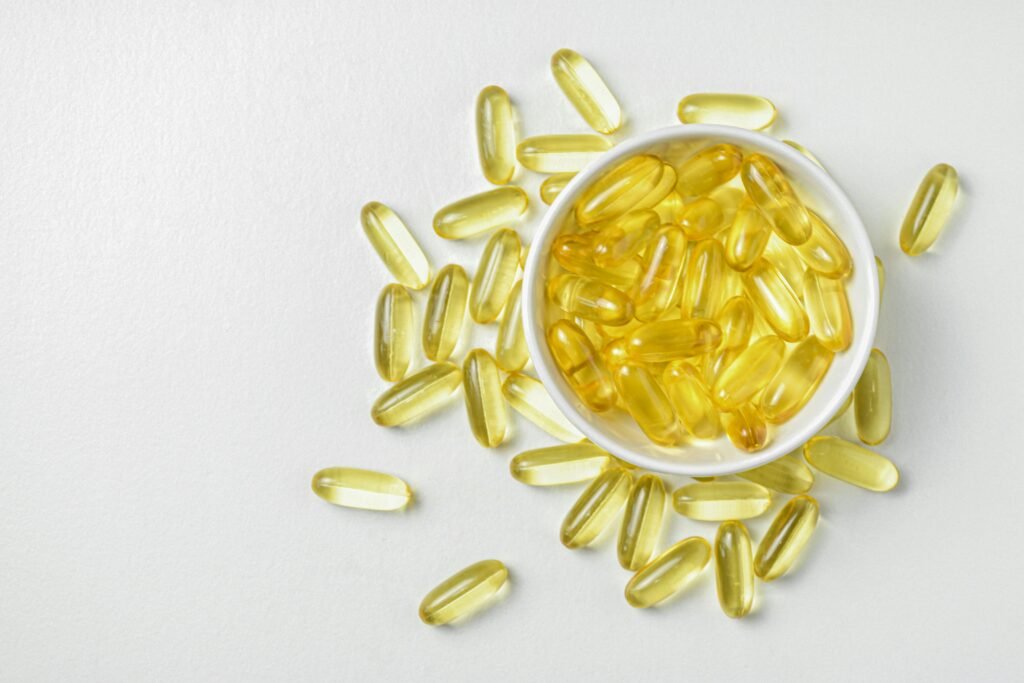Omega-3 fatty acids, primarily found in fish oil and certain plant sources, have garnered attention for their numerous health benefits. From promoting heart health to supporting brain function, these essential fats play a vital role in overall well-being. However, determining the right dosage to achieve optimal health effects can be challenging. This guide will delve into the recommended dosages of Omega-3 fatty acids based on scientific research, and explore their wide-ranging health benefits.

The Different Types of Omega-3 Fatty Acids
There are three main types of Omega-3s:
- EPA (Eicosapentaenoic Acid) – Found in fatty fish like salmon, mackerel, and sardines. EPA has anti-inflammatory properties and is crucial for heart health.
- DHA (Docosahexaenoic Acid) – Also found in fish oil, DHA is vital for brain and eye health, and it supports cognitive development.
- ALA (Alpha-Linolenic Acid) – A plant-based Omega-3 found in flaxseeds, chia seeds, and walnuts. The body can convert ALA into EPA and DHA, though the conversion rate is low.
General Recommended Dosage of Omega-3s
The ideal dosage of Omega-3s varies depending on age, health conditions, and lifestyle. However, several organizations offer general guidelines:
- American Heart Association (AHA): For individuals without heart disease, the AHA recommends eating fish (particularly fatty fish) at least twice per week. This provides around 500 mg/day of combined EPA and DHA. For those with existing heart disease, 1,000 mg/day of EPA and DHA is recommended, typically from supplements if not achievable through diet.
- European Food Safety Authority (EFSA): For the general population, EFSA advises at least 250-500 mg/day of EPA and DHA to maintain cardiovascular health and reduce the risk of chronic diseases.
- National Institutes of Health (NIH): The NIH suggests that adults consume 1.1 to 1.6 grams/day of ALA, which is converted into EPA and DHA. However, for those focusing on fish-based Omega-3s, the equivalent dosage would be around 500-1,000 mg/day of EPA and DHA combined.
Specific Dosage Recommendations for Health Conditions
- Heart Health: Omega-3s are renowned for their cardioprotective benefits, including lowering triglyceride levels, reducing blood pressure, and preventing arrhythmias. To reap these benefits, the recommended dosage is between 1,000-2,000 mg/day of EPA and DHA combined. Studies show that higher doses (up to 4,000 mg/day) may be necessary to lower triglyceride levels significantly .
- Cognitive Health and Mood Disorders: DHA is particularly crucial for brain health, with studies suggesting that DHA supplementation can help improve memory, cognition, and mood. For general brain health, a daily intake of 500-1,000 mg/day of DHA is recommended. For mood disorders like depression or anxiety, clinical studies often suggest a higher dosage of 1,000-2,000 mg/day, with an emphasis on EPA-rich supplements .
- Pregnancy and Infant Development: Omega-3s, particularly DHA, are vital for fetal brain and eye development. Pregnant and breastfeeding women are advised to take at least 200-300 mg/day of DHA. This can be achieved through prenatal supplements or increased fish consumption .
- Inflammatory and Autoimmune Conditions: The anti-inflammatory properties of Omega-3s make them beneficial for conditions like rheumatoid arthritis and lupus. For these purposes, the recommended dosage can range from 2,000-3,000 mg/day of EPA and DHA, with some studies suggesting benefits from doses as high as 4,000 mg/day .
Are There Risks to Higher Dosages?
Though Omega-3s are generally safe, extremely high doses (above 3,000 mg/day from supplements) can thin the blood and increase the risk of bleeding. This is particularly a concern for individuals on blood-thinning medications. It’s essential to consult with a healthcare professional before starting high-dose Omega-3 supplementation, especially for individuals with existing medical conditions or those taking medication.
The Bottom Line
Omega-3 fatty acids offer a host of benefits for heart health, brain function, and inflammation reduction. The ideal dosage varies depending on individual needs, but for most people, 500-1,000 mg/day of combined EPA and DHA is sufficient for general health. For those with specific conditions such as heart disease or mood disorders, higher dosages may be beneficial.

To maximize the benefits of Omega-3s, a combination of a diet rich in fatty fish and high-quality supplements is often recommended.
Must-Have Omega-3 Supplements: Bestsellers on Amazon
When looking for high-quality omega-3 supplements on Amazon, it’s a good idea to check out products with high ratings and positive reviews. As of my last search, some of the best-reviewed omega-3 supplements include:
Fish Oil Supplements
- Nordic Naturals Ultimate Omega – Known for its high purity and potency, it often gets praise for its taste and effectiveness.
- Viva Naturals Omega-3 Fish Oil – This supplement is frequently highlighted for its high concentration of EPA and DHA and lack of fishy aftertaste.
- Dr. Tobias Optimum Omega 3 Fish Oil – It’s popular for its high-quality formulation and enteric coating that helps prevent fishy burps.
- Nature Made Fish Oil – This is a well-known brand with good reviews for its affordability and effectiveness.
- Sports Research Omega-3 Fish Oil – This product is often noted for its non-GMO ingredients and high concentration of EPA and DHA.
Vegan Omega-3 Supplements
For vegan omega-3 supplements, look for products derived from algae, which is a plant-based source of EPA and DHA. Some highly reviewed vegan omega-3 supplements on Amazon include:
- Testa Omega-3 DHA Vegan Algae Oil – Known for its high DHA content and purity. It often receives praise for its quality and effectiveness.
- Deva Vegan Omega-3 DHA – A popular choice for its affordable price and high DHA concentration.
- Nature’s Way NutraVege Omega-3 Algal Oil – This supplement is well-reviewed for its high EPA and DHA content, and for its sustainability.
- MaryRuth Organics Vegan Omega-3 – Noted for its high-quality ingredients and overall effectiveness.
Always make sure to read the most recent reviews and check for third-party testing to ensure quality and safety.
References:
- Omega-3 Dosage for Heart Health. American Heart Association. (2021).
- Omega-3s for Mood Disorders. National Institutes of Health. (2020).
- Fish Oil in Pregnancy and Infant Development. EFSA Journal. (2018).
- Anti-inflammatory Benefits of Omega-3s in Autoimmune Disease. Journal of Rheumatology. (2019).
- The Role of Omega-3s in Triglyceride Management. Circulation. (2022).
By following these guidelines, you can ensure you’re getting the optimal dosage of Omega-3s for your health goals.



